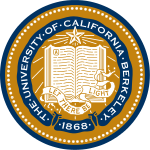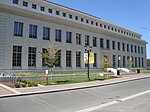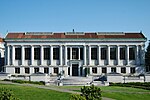University of California, Berkeley School of Information

The UC Berkeley School of Information or the I School is a graduate school offering four degree programs: a professional master's degree in Information Management and Systems (MIMS), a professional master's degree in Information and Data Science (MIDS), a professional master's degree in Information and Cybersecurity (MICS), and an academic doctoral degree. Created in 1994, the I School is UC Berkeley's newest school. It was previously known as the School of Information Management and Systems (SIMS) until 2006. Its roots trace back to UC Berkeley's School of Librarianship founded in the 1920s. The program is located in UC Berkeley's South Hall, near Sather Tower in the center of the UC Berkeley campus.
Excerpt from the Wikipedia article University of California, Berkeley School of Information (License: CC BY-SA 3.0, Authors, Images).University of California, Berkeley School of Information
South Drive, Berkeley
Geographical coordinates (GPS) Address Nearby Places Show on map
Geographical coordinates (GPS)
| Latitude | Longitude |
|---|---|
| N 37.871325 ° | E -122.25853055556 ° |
Address
South Hall (School of Information)
South Drive
94720 Berkeley
California, United States
Open on Google Maps







